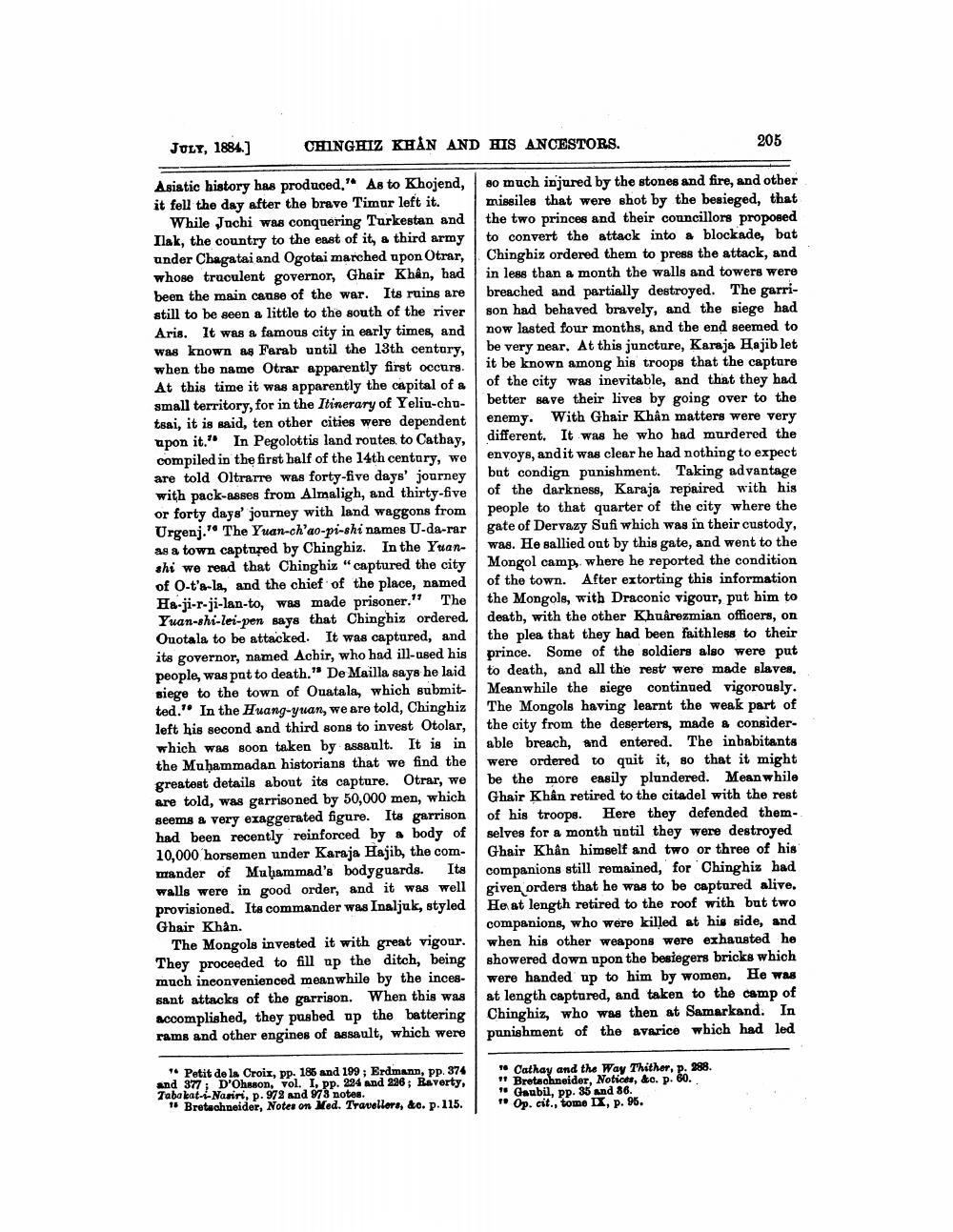________________
CHINGHIZ KHAN AND HIS ANCESTORS.
JULY, 1884.]
Asiatic history has produced." As to Khojend, it fell the day after the brave Timur left it.
While Juchi was conquering Turkestan and Ilak, the country to the east of it, a third army under Chagatai and Ogotai marched upon Otrar, whose truculent governor, Ghair Khân, had been the main cause of the war. Its ruins are still to be seen a little to the south of the river Aris. It was a famous city in early times, and was known as Farab until the 13th century, when the name Otrar apparently first occurs. At this time it was apparently the capital of a small territory, for in the Itinerary of Yeliu-chutsai, it is said, ten other cities were dependent upon it." In Pegolottis land routes, to Cathay, compiled in the first half of the 14th century, we are told Oltrarre was forty-five days' journey with pack-asses from Almaligh, and thirty-five or forty days' journey with land waggons from Urgenj." The Yuan-ch'ao-pi-shi names U-da-rar as a town captured by Chinghiz. In the Yuanshi we read that Chinghiz "captured the city of O-t'a-la, and the chief of the place, named Ha-ji-r-ji-lan-to, was made prisoner." The Yuan-shi-lei-pen says that Chinghiz ordered. Ouotala to be attacked. It was captured, and its governor, named Achir, who had ill-used his people, was put to death." De Mailla says he laid siege to the town of Ouatala, which submitted." In the Huang-yuan, we are told, Chinghiz left his second and third sons to invest Otolar, which was soon taken by assault. It is in the Muḥammadan historians that we find the greatest details about its capture. Otrar, we are told, was garrisoned by 50,000 men, which seems a very exaggerated figure. Its garrison had been recently reinforced by a body of 10,000 horsemen under Karaja Hajib, the commander of Muhammad's bodyguards. Its walls were in good order, and it was well provisioned. Its commander was Inaljuk, styled Ghair Khan.
The Mongols invested it with great vigour. They proceeded to fill up the ditch, being much inconvenienced meanwhile by the incessant attacks of the garrison. When this was accomplished, they pushed up the battering rams and other engines of assault, which were
"Petit de la Croix, pp. 185 and 199; Erdmann, pp. 374 and 377 D'Ohsson, vol. I, pp. 224 and 226; Raverty, Tabakat--Nasiri, p. 972 and 973 notes.
1 Bretschneider, Notes on Med. Travellers, &c. p. 115.
205
so much injured by the stones and fire, and other missiles that were shot by the besieged, that the two princes and their councillors proposed to convert the attack into a blockade, bat Chinghiz ordered them to press the attack, and in less than a month the walls and towers were breached and partially destroyed. The garrison had behaved bravely, and the siege had now lasted four months, and the end seemed to be very near. At this juncture, Karaja Hajib let it be known among his troops that the capture of the city was inevitable, and that they had better save their lives by going over to the enemy. With Ghair Khân matters were very different. It was he who had murdered the envoys, and it was clear he had nothing to expect but condign punishment. Taking advantage of the darkness, Karaja repaired with his people to that quarter of the city where the gate of Dervazy Sufi which was in their custody, was. He sallied out by this gate, and went to the Mongol camp, where he reported the condition of the town. After extorting this information the Mongols, with Draconic vigour, put him to death, with the other Khuârezmian officers, on the plea that they had been faithless to their prince. Some of the soldiers also were put to death, and all the rest were made slaves. Meanwhile the siege continued vigorously. The Mongols having learnt the weak part of the city from the deserters, made a considerable breach, and entered. The inhabitants were ordered to quit it, so that it might be the more easily plundered. Meanwhile Ghair Khân retired to the citadel with the rest of his troops. Here they defended themselves for a month until they were destroyed Ghair Khân himself and two or three of his companions still remained, for Chinghiz had given orders that he was to be captured alive. He at length retired to the roof with but two companions, who were killed at his side, and when his other weapons were exhausted he showered down upon the besiegers bricks which were handed up to him by women. He was at length captured, and taken to the camp of Chinghiz, who was then at Samarkand. In punishment of the avarice which had led
Cathay and the Way Thither, p. 288. "Bretschneider, Notices, &c. p. 60. "Gaubil, pp. 35 and 36. 1 Op. cit., tome IX, p. 95.




